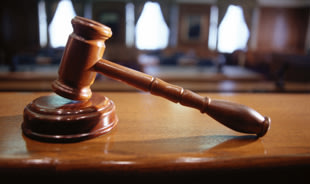By Jason Sickles
 Courtroom gavel (Thinkstock)Behavioral addictions could be considered bona fide illnesses under the American Psychiatric Association?s new manual for mental disorders, prompting criticism from some pundits.
Courtroom gavel (Thinkstock)Behavioral addictions could be considered bona fide illnesses under the American Psychiatric Association?s new manual for mental disorders, prompting criticism from some pundits.
?You see, I'm addicted to bling, so I just had to knock over the jewelry store,? quipped Kent Scheidegger on his Crime and Consequences blog as a possible excuse a suspect might give.
Scheidegger is legal director and general counsel for the Criminal Justice Legal Foundation, a nonprofit public interest group dedicated to advocating swift and fair punishment for criminals.
His bling addiction humor aside, Scheidegger told Yahoo News he?s concerned about how the APA?s Diagnostic and Statistical Manual of Mental Disorders, 5th Edition (DSM-5) will play out in the legal community. The ?bible? for psychiatric diagnoses is primarily a health care tool, but is often quoted as gospel in courtrooms, too.
?In an awful lot of criminal cases, the guy is guilty as sin ? they?ve got him cold, and [defense attorneys] turn to mental defenses as a last resort,? Scheidegger said.
The new DSM broadens the scope for adult attention deficit disorder and adds a controversial diagnosis of "disruptive mood dysregulation disorder" (defined by critics as temper tantrums) for children.
?Forensically, we can expect to see it asserted in approximately 98% of juvenile delinquency cases,? Scheidegger wrote on his crime blog.
DSM-5 reportedly makes little change regarding personality disorders, a section some argued was in need of a clearer set of diagnostic guidelines.
?Personality disorders ? that?s one that really stick in my craw,? Scheidegger said of its use in criminal defense. ?Anti-social personality disorder is nothing more than a clinical-sounding label for people who are just plain evil.?
But Texas lawyer Barry Sorrels said he gives ?the 'DSM' and the people that are responsible for producing it great credibility. It?s the handbook that we all refer to to get our sea legs beneath us on these issues.?
The veteran criminal defense attorney said expert testimony by a psychologist or psychiatrist can be especially useful in punishment phases.
?If it can be proven and if it?s believed, then the jury or the judge needs to hear about evidence related to mental health issues,? Sorrels said. ?I doubt mood disorders would ever be used as evidence for legal insanity, but I could see them being used in mitigation to help explain somebody?s behavior.?
Like the previous version, DSM-5 will include a disclaimer regarding its relevancy as a legal instrument. The opening pages of DSM-4 explain that the categorizations of mental disorders ?may not be wholly relevant to legal judgments, for example, that take into account such issues as individual responsibility ? and competency.?
?But it?s used that way anyway,? Scheidegger said. ?There are some disorders that indeed have an impact on a person?s culpability and there are others that really don?t.?
He worries that more definitions and diagnosis will only cloud the focus of judges and juries.
?It probably aggravates an already difficult situation,? Scheidegger said. ?Unfortunately there?s a long history of juries being excessively gullible when confronted with an expert.?
Sorrels, who has defended clients in hundreds of cases, scoffed at the notion.
?Well, I guarantee you the most gullible of all juries are a lot smarter than people who think juries are gullible; that?s been my experience,? he said.
Howard Zonana, a reviewer of DSM-5 on behalf of the APA?s Council of Psychiatry and the Law, said DSM discord is to be expected, but that he is still a believer in the publication as a useful guide.
?With a new book there are going to be some changes and it?s always unclear how that?s going to play out in a courtroom,? said Zonana, a clinical professor at Yale Law School. ?We?ll probably learn just like we did with the other ones what things are problematic and what things aren?t.?
The problematic part is what steers veteran forensic psychologist Charlton Stanley away from the DSM as much as possible.
?When it comes to a criminal case, oftentimes when you try to get into a diagnosis, all it does is muddy the waters,? Stanley said. ?The DSM is a book created by a committee who is sensitive to what is politically correct. They put stuff in and take stuff out based on criteria that nobody seems to understand.?
Source: http://news.yahoo.com/blogs/lookout/courtroom-mental-illness-manual-often-debated-134108880.html
Marfa Texas leonhard euler venezuela kobe bryant adam scott Chi Cheng xbox live
No comments:
Post a Comment
Note: Only a member of this blog may post a comment.